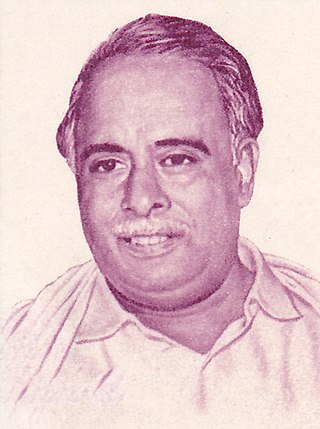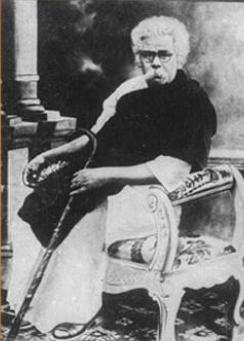
The Dravida Munnetra Kazhagam is an Indian political party based in the state of Tamil Nadu, where it is currently the ruling party, and the union territory of Puducherry, where it is currently the main opposition.

Muthuvel Karunanidhi was an Indian writer and politician who served as Chief Minister of Tamil Nadu for almost two decades over five terms between 1969 and 2011. He is popularly referred to as Kalaignar (Artist) and Mutthamizh Arignar for his contributions to Tamil literature. He had the longest intermittent tenure as Chief Minister of Tamil Nadu with 6,863 days in office. He was also a long-standing leader of the Dravidian movement and ten-time president of the Dravida Munnetra Kazhagam political party. Karunanidhi has the record of never losing an election to the Tamil Nadu Assembly, having won 13 times since his first victory in 1957. Before entering politics, he worked in the Tamil film industry as a screenwriter. He also made contributions to Tamil literature, having written stories, plays, novels, and a multiple-volume memoir. Karunanidhi died on 7 August 2018 at Kauvery Hospital in Chennai after a series of prolonged, age-related illnesses.
The Justice Party, officially the South Indian Liberal Federation, was a political party in the Madras Presidency of British India. It was established on 20 November 1916 in Victoria Public Hall in Madras by Dr C. Natesa Mudaliar and co-founded by T. M. Nair, P. Theagaraya Chetty and Alamelu Mangai Thayarammal as a result of a series of non-Brahmin conferences and meetings in the presidency. Communal division between Brahmins and non-Brahmins began in the presidency during the late-19th and early-20th century, mainly due to caste prejudices and disproportionate Brahminical representation in government jobs. The Justice Party's foundation marked the culmination of several efforts to establish an organisation to represent the non-Brahmins in Madras and is seen as the start of the Dravidian Movement.

Dravidar Kazhagam is a social movement founded by 'Periyar' E. V. Ramasamy. Its original goals were to eradicate the ills of the existing caste and class system including untouchability and on a grander scale to obtain a "Dravida Nadu" from the Madras Presidency. Dravidar Kazhagam would in turn give birth to many other political parties, including Dravida Munnetra Kazhagam and later the All India Anna Dravida Munnetra Kazhagam.

Conjeevaram Natarajan Annadurai, also known as Perarignar, was an Indian politician who was the founder and first general-secretary of the Dravida Munnetra Kazhagam (DMK). He served as the fourth and last chief minister of Madras State from 1967 until 1969, and then as the first chief minister of Tamil Nadu for 20 days before his death in office. He was the first member of a Dravidian party to hold either post.
The anti-Hindi agitations in Tamil Nadu is the opposition to Hindi imposition in the southern Indian state of Tamil Nadu since the 20th-century. The agitations involve several mass protests, riots, student and political movements in Tamil Nadu concerning the official status of Hindi in the state.
Dravida Nadu is a name of a proposed sovereign state demanded by the Justice Party led by the founder of the self-respect movement, Periyar, and the Dravida Munnetra Kazhagam (DMK) led by C. N. Annadurai for the speakers of the Dravidian languages in South India.
Dravidian parties include an array of regional political parties in the state of Tamil Nadu, India, which trace their origins and ideologies either directly or indirectly to the Justice Party and the Dravidian movement of C. Natesanar and Periyar E. V. Ramasamy. The Dravidian movement was based on the linguistic divide in India, where most of the Northern Indian, Eastern Indian and Western Indian languages are classified as Indo-Aryan, whereas the South Indian languages are classified as Dravidian. Dravidian politics has developed by associating itself to the Dravidian community. The original goal of Dravidian politics was to achieve social equality, but it later championed the cause of ending the domination of North India over the politics and economy of the South Indian province known as Madras Presidency.
Erode Venkatappa Krishnasamy Sampath, usually referred to as E. V. K. Sampath was a prominent politician from Tamil Nadu, India. He was an advocate of the Dravidian Movement of Periyar E. V. Ramasamy and was considered by some as his political heir. He later split from Periyar's Dravidar Kazhagam to form Dravida Munnetra Kazhagam (DMK) along with C. N. Annadurai. In spite of being one of the founders of DMK he later left and formed his own party, by the name, Tamil National Party. Nevertheless, he later merged his party with the Indian National Congress. He is a former Member of Parliament from the constituency of Namakkal.

Tamil nationalism is the ideology which asserts that the Tamil people constitute a nation and promotes the cultural unity of Tamil people. Tamil nationalism is primarily a secular nationalism, that focus on language and homeland. It expresses itself in the form of linguistic purism, linguistic nationalism, Social equality and Tamil Renaissance.

Erode Venkatappa Ramasamy, commonly known as Periyar, was an Indian social activist and politician. He was the organizer of the Self-Respect Movement and Dravidar Kazhagam and is considered the architect of Dravidian politics, as well as a leading figure of left-wing politics in India.
Dravidian parties rose to power and prominence in the political stage of Tamil Nadu, a state in India, in the 1960s. The rise in power and political support was gradual until Dravida Munnetra Kazhagam (DMK), a Dravidian party, formed the government in the state in 1967. Although since the 1970s the Dravidian parties have met with many break-aways and have taken rival stances against each other, the seat of power in Tamil Nadu has been with one or another Dravidian party. The increase in popularity of the Dravidian parties in the 1960s is attributed to several factors, including the fall of popularity of the Congress Government in the centre and the north–south disparity, as claimed by the Dravidian politics. The series of events climaxed with anti-Hindi agitation which led to the downfall of popularity of the then Indian National Congress government in the state and the eventual rise of Dravidian parties to power.

The religious beliefs of Periyar involved opposition to religion virulently because, in his views, the so-called men of religion invented myths and superstitions to keep the innocent and ignorant people in darkness and to go on exploiting them. He was an atheist and a rationalist in his own right. Periyar had been a harsh critic of Brahminical Hinduism in Tamil Nadu, and he also criticized Islam, Buddhism and Christianity. He has spoken appreciatively of these other faiths in India finding in their ethics principles of equality and justice, thus advocating them if they can prove an alternative to Brahamanic Hinduism. With regards to institutionalized religion being used for personal gain, Periyar stated that "religion goes hand in hand with superstition and fear. Religion prevents progress and suppresses man. Religion exploits the suppressed classes." As religions, however they are prone to be hit by accusation of superstition, exploitation and irrationalism.
Tamil cinema has played a vital role in Dravidian politics in the South Indian state of Tamil Nadu. Films have been influential in Indian politics since the days of the British Raj, when movies were used for anti-British propaganda. Nevertheless, the leaders of the Indian National Congress viewed movie media with contempt. It was the Dravida Munnetra Kazhagam (DMK), a Dravidian party, that made extensive use of this media for propaganda purposes. Adversaries of Dravidian parties despised the use of films and screen popularity for political gain, and Congress leaders like K. Kamaraj questioned the possibility of movie stars forming governments.
S. Natarajan Udayar was an Indian politician and 3 time DMK MLA from Thanjavur Constituency. A close friend and supporter of Periyar E.V. Ramaswamy, he was an early member of Dravidar Kazhagam. His association with Aringar C N Annadurai made him part ways with E.V.R. politically and join Dravida Munnetra Kazhagam (DMK) as one of the earliest and founding members of DMK.

The anti-Hindi imposition agitation of 1937–1940 refers to a series of protests that happened in Madras Province of British India during 1937–1940. It was launched in 1937 in opposition to the introduction of compulsory teaching of Hindi in the schools of the province by the Indian National Congress government led by C. Rajagopalachari (Rajaji). This move was immediately opposed by Periyar and the opposition Justice Party. The agitation, which lasted for about 30 months, was multifaceted and involved fasts, conferences, marches, picketing and protests. The government responded with a crackdown resulting in the death of two protesters and the arrest of 1,198 persons including women and children. The mandatory Hindi education was later withdrawn by the British governor of Madras Lord Erskine in February 1940 after the resignation of the Congress government in 1939.

Dewan Khan Bahadur P. Khalifullah (1888–1950), was a politician of the Madras Presidency, British India, who served as the minister for public works in the short-lived ministry of Kurma Venkata Reddy Naidu from April–July 1937. He was a Tamil Muslim belonging to the Rowther community, and his father was a wealthy businessman of Tiruchirapalli. Born in 1888 in Tiruchi into a wealthy rice merchant's family, his birth name was Mohamed Pichai Rowther Ibrahim Khalifullah. He went on to be known by the honorific Khan Bahadur, a title bestowed on him by the British. In later years, his work as the Dewan of Pudukottai made him more popular as ‘Dewan Khalifullah.’

The Self-Respect Movement is a popular human rights movement originating in South India aimed at achieving social equality for those oppressed by the Indian caste system, advocating for lower castes to develop self-respect. It was reportedly founded by Periyar to head the India against Brahminism movement in Tamil Nadu.
Erode Venkatappa Ramasamy Nagammai was an Indian social activist and women's rights activist. She was known for her participation in the Temperance movement in India and the Vaikom Satyagraha. She was the first wife of Periyar who headed the Self-Respect Movement.
Anti-North Indian sentiment refers to the socio-political attitudes and movements against people and communities originating from North India, particularly the Hindi heartland. This sentiment is often rooted in regionalist ideologies, cultural differences, and economic competition. It is especially visible in regions like Tamil Nadu, Karnataka, and Maharashtra, where tensions arise from migration, linguistic imposition, and the perception that North Indian migrants are disrupting local cultures and economies. These sentiments often stem from concerns over cultural dominance and fears that local languages and identities will be eroded by the growing influence of Hindi and its speakers.







